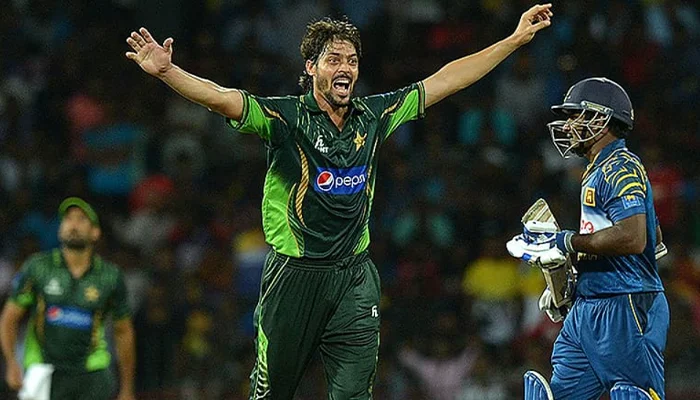History of Anwar Ali: From Start to Team Departure

(Anwar Ali during a photo shoot for the Pakistan team)
It was the year 2006 when Pakistan was playing India in the Under-19 Finals at the R Premadasa Stadium, Colombo, and being the big match, the pressure was on both teams to seal the victory. With players such as Rohit Sharma, Cheteshwar Pujara, Ravindra Jadeja and others being on the Indian side, it looked like an easy victory for them until the Pakistan pacer Anwar Ali entered the field with the ball in his hand. However, despite displaying remarkable talent and potential on that memorable day, Anwar Ali's journey took a puzzling turn thereafter. Despite possessing a formidable arsenal of bowling skills, Ali found himself gradually fading from the limelight of Pakistani cricket. Despite early promise, the reasons behind his disappearance from the national team remained a mystery, leaving cricket enthusiasts pondering over what could have been for the talented fast bowler.
Anwar Ali’s early career
Pakistan has always been a land of fast bowlers that has produced legends like Wasim Akram, Waqar Younis, Shoaib Akhtar, and many more. Considering this, Anwar Ali is one such name that could have made his entry to this list. Born on 25th November 1987, he started his cricketing journey early in his life in Karachi, Sindh. He comes from a Gujjar family in Swat but moved to Karachi as a child. Growing up, he worked as a factory labourer, ironing socks to support his family. Despite the challenges, cricket became his passion amidst Karachi's bustling streets. His talent shone through, catching the attention of selectors. From his humble beginnings, Anwar's journey from the factory floor to cricket stadiums around the world is a story of determination and resilience. It's a reminder of how sport can transform lives, offering hope and opportunity in the face of adversity.
Breakthrough match for Anwar Ali
The 2006 Under-19 World Cup was the tournament that got the best of Anwar Ali as he finished the competition with 15 wickets from the 6 innings played while having an economy rate of 3.42.
The whole tournament was brilliant for them and in the Finals of the tournament, Pakistan was playing against the Indian team and it was going to be a big match in the India-Pakistan rivalry now. The match started with the Pakistan under-19 team winning the toss and getting the chance to bat first. However, the team wasn’t able to do well as they lost early wickets and were bowled out for just 109 runs in 41.1 overs. Anwar Ali produced a knock of 17 runs from 42 balls to give the team a chance to get a better target.
Considering a target of 110 runs, India under-19s were confident of making it their day and hence were looking all set to take the trophy. But what followed after this was just incredible as the bowler Anwar Ali came out of the syllabus for the opponents. In his first over, Anwar Ali picked the wickets of the backbone of the Indian team as Cheteshwar Pujara got out on a duck while Rohit Sharma scored just 4 runs from the 7 balls played. After this, Anwar Ali was just unstoppable and he went on to pick the wickets of Mayank Tehlan, Debabrata Das, and Ravindra Jadeja to leave the Indian team at 7-23 in 7.6 overs.

(Anwar Ali celebrating with his teammates after picking a wicket)
With this, the Indian team was hardly going to get back in the game and hence were bowled out for just 71 runs in the 18.5 overs and hence failed in the game. With a winning margin of 38 runs to their name, Pakistan under-19 lifted the World Cup and Anwar Ali was awarded the Man of the Match award for his 17 runs from 42 balls and then picking up 5 wickets from the 35 runs given in his bowling.
How did Anwar Ali fade away from Pakistan cricket?
After becoming an International star in the Under-19 World Cup finals, everyone expected Anwar Ali to become one of the leading pacers for the Pakistan team. Following his selection in the training squad for the ODI series against Zimbabwe in 2008, Anwar Ali's cricketing journey gained momentum. He left a lasting impression during subsequent tours of Zimbabwe and Kenya with the Academy team, showcasing his talent by securing an impressive 29 wickets at an average of 16.31.
|
Format |
Matches |
Innings |
Balls |
Runs |
Wickets |
Economy |
|
ODI |
22 |
22 |
927 |
944 |
18 |
6.11 |
|
T20I |
16 |
15 |
265 |
367 |
10 |
8.31 |
(Anwar Ali’s career stats)
Anwar Ali's early successes in first-class cricket showcased his versatility. Apart from his bowling prowess, he displayed batting talent with an unbeaten century, proving his ability to contribute effectively down the order. His performances highlighted his all-round capabilities, earning him recognition as a valuable asset for his team. However, the later part of his career was marked with injuries and hence he was out of the Pakistan team because of it. Throughout his career, he got only 22 ODI matches where he was able to take 18 wickets with an economy rate of 6.11 while his T20 career had seen only 16 matches which gave him 10 wickets with an economy rate of 8.31.
In Anwar Ali's absence, Rohit Sharma expressed concern about his injuries and extended well wishes for a speedy return to the field. However, despite his efforts, recurring injuries hampered Ali's performance, leading to his sidelining from international cricket. This setback prompted a return to domestic cricket, where he joined Multan Sultans for the PSL 8 season while also representing various other domestic teams. Despite facing challenges, Ali remained determined to overcome his injury woes and reclaim his spot on the international stage, showcasing resilience and dedication to his craft.

(Anwar Ali celebrating after picking up a wicket in the match against Sri Lanka)
Pakistan cricket suffered a significant loss with the departure of Anwar Ali, a player of immense calibre known for his remarkable ability to swing the ball in both directions. Despite his exceptional talent, his absence left a noticeable gap in the team, depriving them of a valuable asset capable of turning matches in their favour. Anwar's departure was deeply felt by fans and teammates alike, who recognized his potential to be a game-changer on the field. His legacy serves as a poignant reminder of the untapped potential and the loss of a true gem in Pakistan's cricketing history.

Comments
Sign up or log in to your account to leave comments and reactions
0 Comments